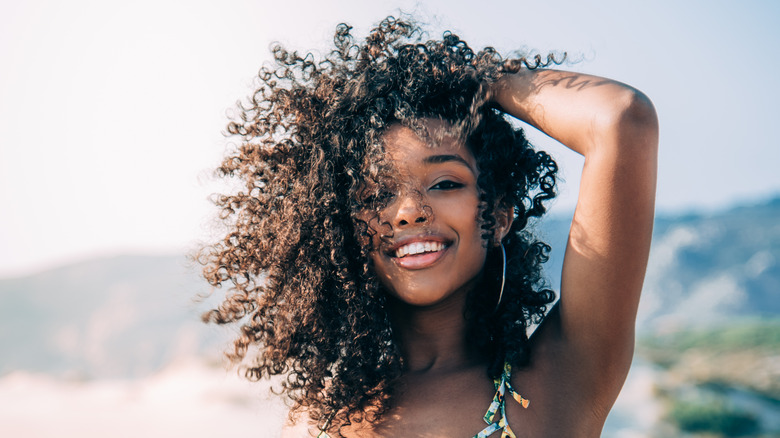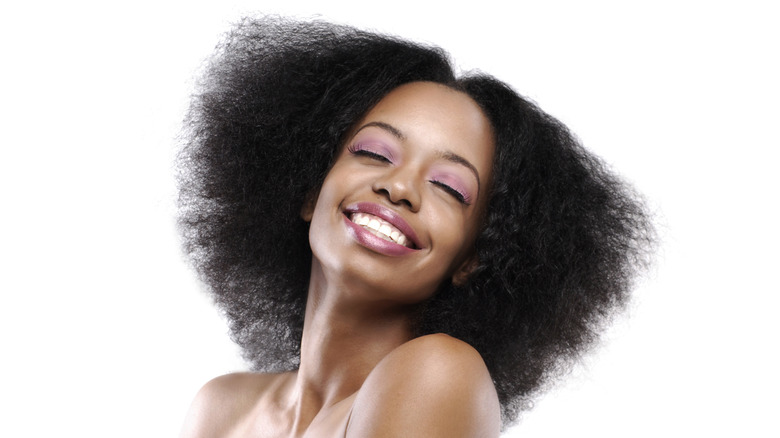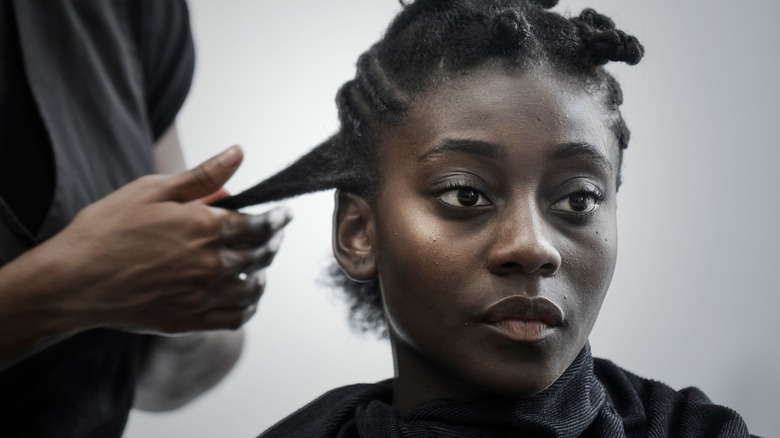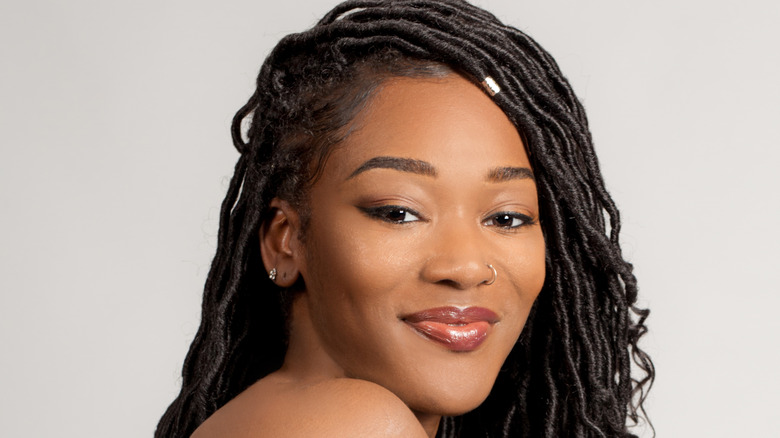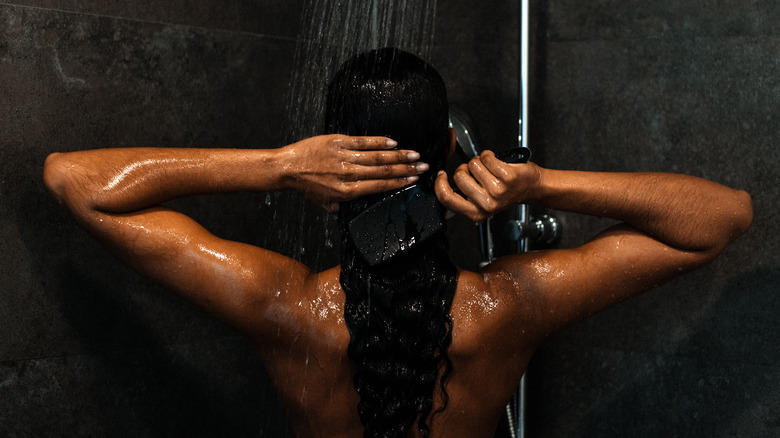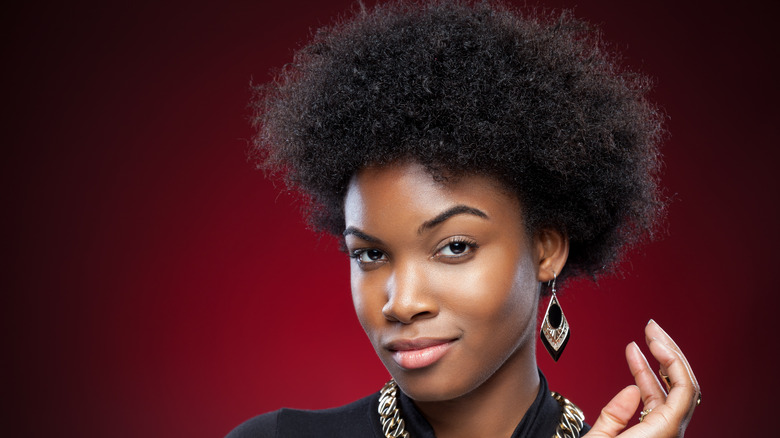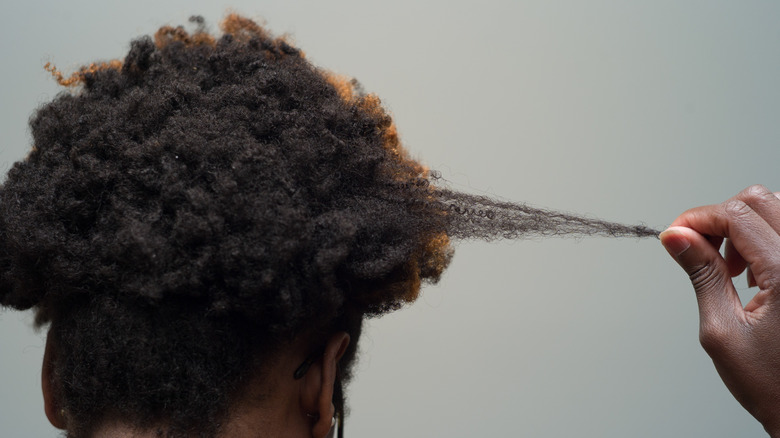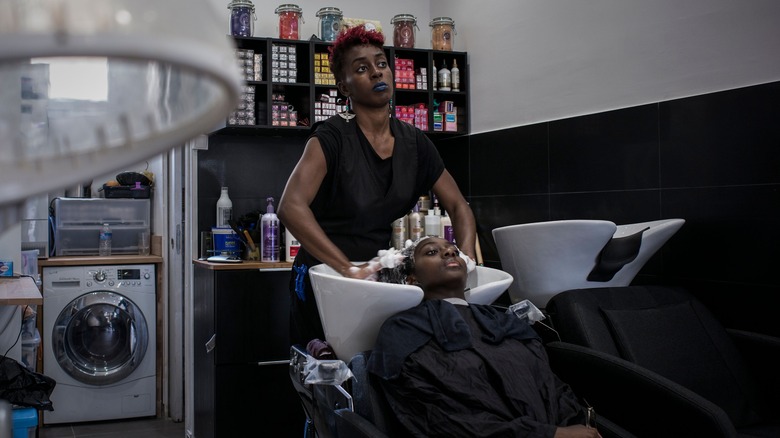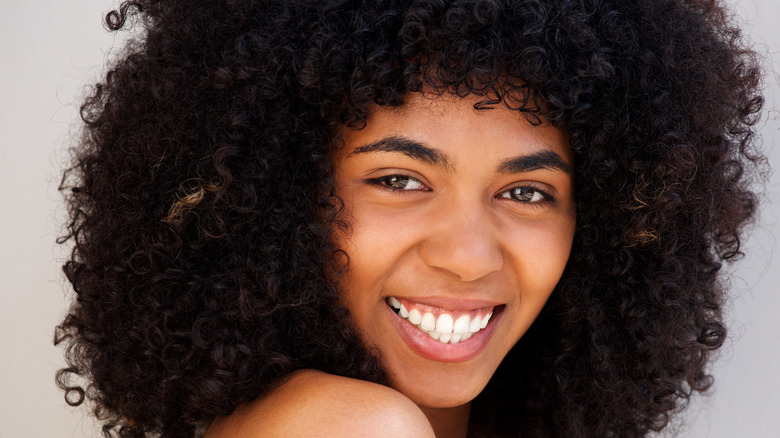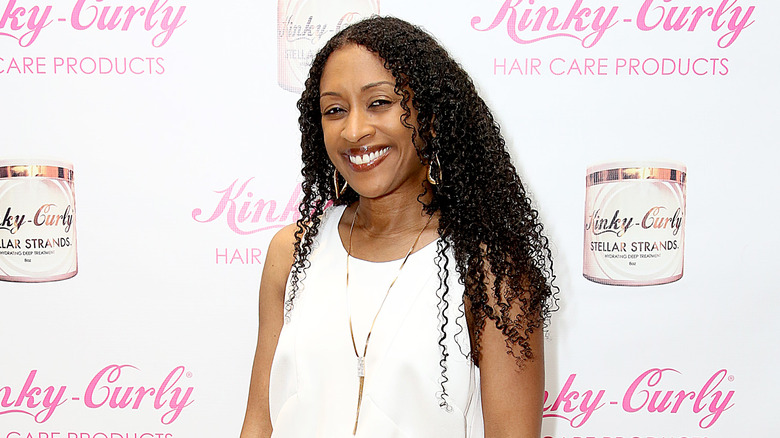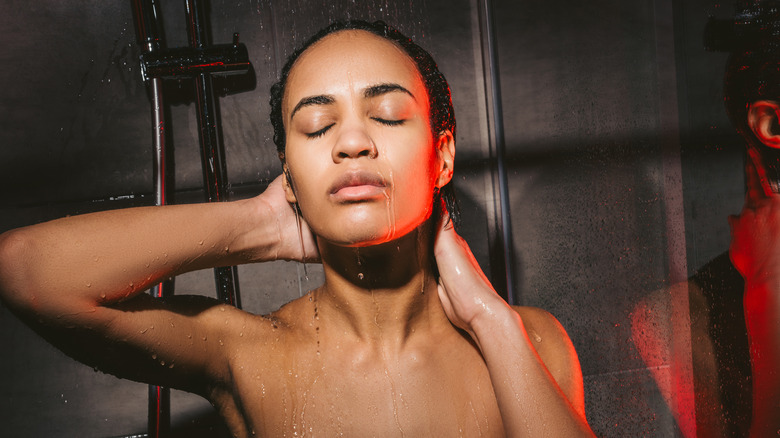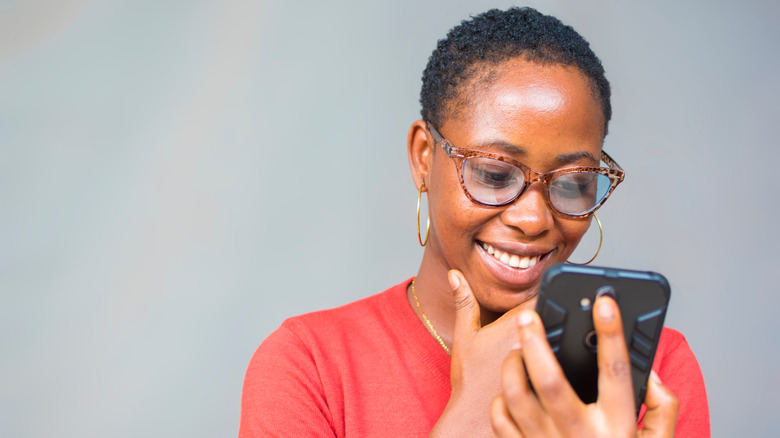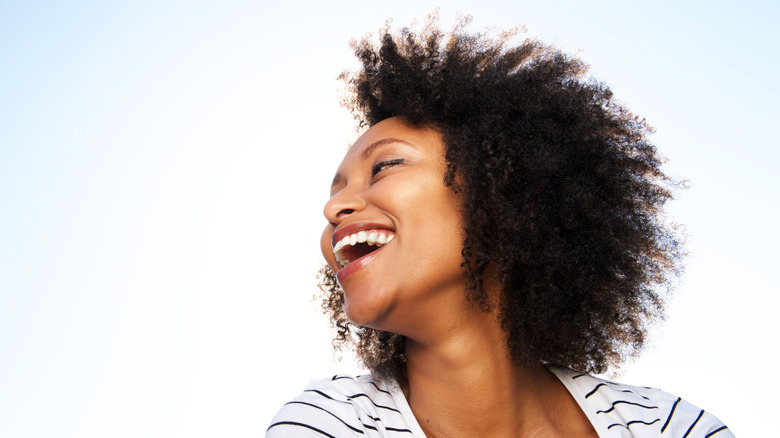Truths About Natural Hair No One Understands
Natural hair has gained popularity in the black community in recent years. For decades, many black women looked to harsh chemicals to straighten their hair. But these days, an increasing number of black women are omitting the chemicals in favor of a more natural approach to hair care. A 2018 report from Mintel revealed that black women are "most likely to wear their hair natural." According to the data, a whopping 40 percent of these women have turned to both chemical-free and no-heat styling, while an additional 33 percent of black women still prefer heat-styling, but have cut out all chemicals.
Although the natural hair trend has certainly taken off, donning natural hair is more complicated than it sounds. On top of that, many women who've decided to embrace natural hair face daily discrimination and emotional strife. The chief issue in the natural hair movement, as it turns out, is that relatively few people understand all there is to know about natural hair. If you've ever wondered about natural hair or are considering taking the plunge, here are a few things you should know.
What going natural really means
To truly understand black hair care — natural or otherwise — it's important to get up to speed with some of the terminology. After all, the world of black hair care has a language all its own.
First, we have to talk perms. Used interchangeably, relaxers and perms can mean the same thing. but you won't want to confuse this kind of perm with the one that curls straight hair. Instead, a relaxer — or perm — is a chemical solution that's applied to extremely curly, coiled hair to make it lay straight. Though these products are less harsh than they used to be, they can still do damage to both your scalp and your hair.
Another term you'll hear often (especially throughout this article) is "natural." To be or to go natural is somewhat of a less concrete idea. In general, being natural means you don't use any chemicals to alter the texture or natural curl pattern of your hair. That means no relaxers, no perms to curl naturally straight hair, and no texturizers to loosen tight curls. Because hair dye also contains chemicals, some women choose not to dye their hair.
The big chop
So, you've decided you want to go natural. First though, you'll need to decide how you'll be making this transition. Many women opt for what's called "the big chop" — and it's exactly what it sounds like. The big chop requires chopping off most, if not all, of your hair.
Relaxers, perms, and texturizers damage and weaken the hair shaft, and this is something that could be irreversible. Because chemically-treated hair will retain its altered appearance, many women choose to chop it all off instead of growing it out. This will help you avoid a mix of natural roots and frayed, relaxed ends. But choosing to part ways with your hair is a big deal.
Hair has long been used throughout history to indicate a woman's health status and social position. Long hair has even been associated with youthfulness. Chopping off your hair, even while knowing it will likely grow back healthier and stronger, can cause you some serious grief. It's not an easy decision.
The transition
If the big chop intimidates you, you should know it is not mandatory for a successful transition. Instead, some women choose to wear their hair in a protective hairstyle while transitioning to natural hair. Protective styles are as they sound — hairstyles that protect hair from damage. Protective styles can range from wigs to full-head weaves with the natural hair tucked away to wearing box braids or twists.
These kinds of protective hairstyles are helpful because they work to decrease tangling, shedding, and even breakage. They also protect your hair against you. When wearing a protective style, you drastically reduce your odds of engaging in some seriously bad habits, as noted by NaturAll Club. You know, like over-combing, over-styling, or damaging your hair with heat. While protective hairstyles may sound pretty amazing, you have to remember they aren't completely maintenance-free. NaturAll Club recommends still allowing your hair to "breathe" while in a protective style. It's also imperative to avoid letting too much dirt and/or grease from building up.
Protective styles don't guarantee hair growth
As great as protective styles may be, they don't exactly come with a hair growth guarantee. Stephanie J. McLemore, a hairstylist for Carol's Daughter, told HelloGiggles that these styles encourage hair growth because your hair is "put away and left alone." But simply fashioning your hair into a protective style alone isn't enough to make your hair grow. The expert advised oiling your hair and scalp in an effort to "keep your follicles healthy."
Above all else, though, you need to be prudent about which style you choose. "The most important thing to remember is that tension is bad for the hair and scalp, so please have your stylist ease up on the pulling while applying braids," she cautioned. A protective style is only protective when, well, it protects. If your hair is feeling the effects of tension, you're better off taking your hair out of the seemingly "protective" style.
Learning your type
In the world of natural hair, texture is of huge importance. Oprah Winfrey's hairstylist, Andre Walker, created a revolutionary system to categorize the varying hair textures. According to his hair typing system, there are four major hair types, each with its own subcategories.
As Allure highlighted, the four main categories encompass straight, wavy, curly, and kinky hair patterns. These four common textures not only vary widely in appearance, but also in the ways in which they should be cared for. Knowing the texture of your hair is important because it dictates how often you should clean your hair, what products to use, and, often times, what styles will work best for you.
Black women may have natural hair that runs the full spectrum of Andre Walker's typing system, and, as hairstylist Vernon François told Allure, you could even have "a combination of, say, kinky, coily, wavy, and curly." Still, it's important to know just what you're working with. Anthony Dickey of Hair Rules salon and brand told the publication that you will have an easier time determining your type "while your hair is sopping wet."
Cost is a factor
You might think wearing your hair in its natural state to be the most cost-effective hair care option, but that isn't exactly true. Natural hair care products are pricey in comparison to the general hair care products one might buy to maintain relaxed hair.
In an article for Ebony, writer Kimberly Walker recalled the words she heard others mutter while attending natural hair events: "You can either pay your electricity bill or afford to have natural hair." Yes, maintenance products come with a hefty price tag. The writer highlighted that a 16-ounce jar of Miss Jessie's Buttercream moisturizer retails for $58 while Jane Carter Scalp Nourishing Serum comes in at $14 per ounce. Similarly Anthony Dickey's popular Hair Rules Quench Ultra Rich Conditioner costs a hefty $42. Plus, hair care products with natural ingredients always have a way of costing more than their harsh chemical-containing equivalents. Sigh.
Shrinkage is real, but that's okay
Achieving natural hair with a lengthy appearance can be a challenge thanks to shrinkage. This phenomenon affects all black women with either coily, kinky, or curly hair. Only those with straight hair are unaffected. According to NaturAllClub, "the tighter your curls, the more shrinkage you'll experience because length is lost in forming the shape of your coils." Shrinkage may be frustrating when you're trying to grow out your hair, but it's actually a sign of healthy, elastic hair. And, as the site explained, "You can't have your curl pattern without shrinkage, and the only way to eliminate shrinkage is to straighten your hair." Since you're going natural, straightening would undo all your hard work.
However, you can reduce shrinkage without damaging your hair. The site recommends loosely braiding your hair into sections prior to washing and using a heavier conditioner. When styling, you can also use a heavier moisturizer to further weigh down — and thus elongate the look of — your curls.
Caring for your scalp
Kinky hair is naturally drier and less oily than straight hair, which may leave you facing a conundrum. Wash your curly hair too often and you risk drying out your hair even more. But wash your locks too infrequently and you risk dandruff. Dermatologist Shari Hicks-Graham explained to Bustle, saying, "Because people with curly hair tend to wash their hair less regularly, the oil present at the scalp may accumulate and allow the natural yeasts to proliferate. This then may lead to dryness, scaling and irritation — otherwise known as seborrhea or dandruff."
The doctor recommends using a gentle sulfate-free shampoo and conditioner on a weekly basis for added moisture. However, that's just a guideline. You may find that you have to wash your hair more frequently than once a week, especially if you are very active. It's also a good idea to exfoliate your scalp from time to time. "Products with anti fungal and anti-inflammatory properties are useful, as are ingredients for gentle scalp exfoliation," Hicks-Graham added.
Psychological warfare
In the fall 2008 issue of Michigan Feminist Studies, Cheryl Thompson wrote, "For young black girls, hair is not just something to play with, it is something that is laden with messages, and it has the power to dictate how others treat you, and in turn, how you feel about yourself."
For many black women — with natural hair or otherwise — hair isn't just about a crown. It's a force, guiding your life and defining who you are. The greatest truth of natural hair is that no one can understand the depth of feelings — and even changes — that this kind of hair can evoke. Natural hair can influence the kind of men that are attracted to you and even shift family dynamics. Most notably, natural hair can change you. Going natural may bring up deep-seated issues of insecurity or low self-esteem. Yet, at the same time, women with natural hair will likely tell you that it's incredibly empowering.
Workplace vulnerability
Black women who've embraced their natural hair are all to familiar with workplace discrimination. Rachel, a 25-year-old public relations senior account executive, admitted to Byrdie in 2018 that she's had to think about how her braids or afro would be perceived in a professional setting. "For me, and many black women, rocking my natural tresses is a practice of acceptance, a celebration," she explained. "Feeling like I have to compromise that self-acceptance for the sake of an employer's comfort just doesn't quite sit right and plays a huge role in interview-hair decision." Ultimately, Rachel opts to pull her hair back into a protective style and will "find ways to let [her] personal style" show through upon hire.
Lindsey, a third-year law student, has faced similarly unfair circumstances. "The hardest thing about going natural in the workplace is the vulnerability," she explained. "The nakedness you feel when someone slowly glances at you, taking in your hair fully." The student said she considered straightening her hair for an interview with a New York City law firm. She added, "But then I had a thought: After 19 years of school, how is my hairstyle a reflection of my competence and measure of success?"
"Texture discrimination" is real
Although hairstylist Andre Walker likely came up with his hair typing system to help women identify and properly care for their hair according to its needs, a form of unintended discrimination has taken root since the system's creation. "Women with kinky textured hair, commonly known as type 4, are experiencing something of a 'texture discrimination' as a consequence of this new natural new beauty standard," wrote Ebony natural hair writer Trudy Susan. It is, as the writer pointed out, more common to see women with the three other hair types in advertisements and media.
Susan further explained, writing, "So while the recent rebirth and modern day celebration of natural hair has provided some balance for Black women looking to escape the media induced pressure to yearn for European imitated straight, long hair, now there is a new pressure for natural women to yearn for a specific type of natural hair." Although all forms and types of natural hair deserve to be honored and celebrated, that has sadly not been the case.
Wash day "literally takes a whole day"
When Jasmine Brown embarked on her natural hair journey, she soon realized just how much was involved with going au naturel. "I had never understood why some natural hair girls called it wash day until I went completely natural," she penned in an article for The Odyssey. "The wash and style process literally takes a whole day."
Brown explained that she now plans to wash her hair on Saturdays because it means she'll have the whole day ahead of her to care for her hair. "Natural hair takes up a lot of time, especially when you have to wash it and style it," she explained. Drying alone can eat up one's whole day so Brown recommends starting as early as you possibly can. "I like to start my wash day process around 8 AM so I can at least sort of have the night to myself," the writer admitted.
Trust the process
Women who've joined the natural hair movement will tell you that working with their newfound natural hair didn't exactly come naturally. "I initially went natural 10 years ago as I really wanted an afro," the founder of The Wig Witch, Gina Knight, revealed in an interview with Vice. "I was confronted with this head of hair that I didn't know, but more than that, because I was adopted by a white family, it felt like a relearning of my culture, too."
Musician Hannah Anderson also revealed her experience with going natural. "The hardest part for me was when my hair was an inch or two long, in this really weird and awkward phase," she opined. "I didn't want to cut it but I had no idea what to do with this hair — it kinda stuck up and didn't have any particular shape." Anderson then committed to learning to braid her own hair, which she ended up enjoying. "I didn't really know how to work with my hair in its natural state," she explained, "so it was a learning process for sure, one that was very self-directed and included tons of YouTube videos."
Anyone can rock natural hair
After researching the ins and outs of natural hair, you might think it's the style for you. Or, you might be convinced it would never "work" on you personally. However, it's never the latter and always the former. Ebony natural hair writer LaParis Hawkins explained that your natural hair is, by all accounts, the hair texture with which you were born.
"All Black women have different preferences as to how we wear our hair," the writer explained. That may mean you favor a relaxed style while your sister chooses a perm. You might love the look of hair extensions or a weave while your friend prefers her hair au naturel. There are any number of styles to choose from and, as the writer highlighted, "Let us not forget that it is our choice and decision to wear our hair the way we want." She continued, writing, "If you want to rock your natural hair texture, then do it. It is for you, because it's by you. Period." She's not wrong.

